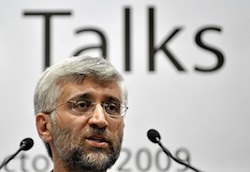Second Round of Iranian Nuclear Talks Begin in Vienna
October 19, 2009
Featured Image
Key Iran Nuclear Talks Convene Monday - Associated Press
- Iran's ability to break out of its peaceful nuclear program and make a weapon could be delayed at talks opening Monday that will test Tehran's willingness to make good on tentative deal reached earlier this month.
- Monday's Vienna talks between Tehran and the U.S., Russia and France, focus on a technical issue with huge strategic ramifications — whether Iran is ready to farm out some of its uranium enrichment program to a foreign country.
- "It buys some time," said David Albright of the Washington-based IISS, which has closely tracked Iran for signs of any covert proliferation. But Albright added that Iran could replace even 1,200 kilograms of low-enriched uranium "in little over a year" at its present rate of enrichment.
Five Myths About Iran's Nuclear Program - Joe Cirincione in the Washington Post [link]
- Iran's expanding nuclear program poses one of the Obama administration's most vexing foreign policy challenges. Fortunately, the conditions for containing Tehran's efforts may be better today than they have been in years.
- But the prospects for developing a strategy with a solid chance of success improve if we dispose of five persistent myths about Iran's nuclear program:
1. Iran is on the verge of developing a nuclear weapon.
2. A military strike would knock out Iran's program.
3. We can cripple Iran with sanctions.
4. A new government in Iran would abandon the nuclear program.
5. Iran is the main nuclear threat in the Middle East.
Reading Mark Hibbs in Washington - ArmsControlWonk [link]
- It’s a red-letter day: David Ignatius of the Washington Post has been reading Mark Hibbs in Nucleonics Week. He [i.e., Ignatius] concludes that molybdenum impurities could prevent Iran from enriching its LEU far beyond present levels.
- No further enrichment, no breakout scenario, right? Well, yes and no.
- These problems probably have nothing to do with sabotage of equipment, as Ignatius seems to have concluded. Instead, it has to do with the withdrawal of the Chinese from the project (under U.S. pressure) ca. 1996.
- From Mark Hibbs: For the record—lest your readers get the false impression of my role in this debate—it should be underscored that I DID NOT conclude in my Oct. 8 article (now I’m quoting your paraphrase of David Ignatius’ piece): “moly impurities could prevent Iran from enriching LEU far beyond present levels.”
Conferees Approve Study of Nuclear Bomb - Washington Post [link]
- The first step toward rebuilding one of the nation's tactical nuclear weapons so it could be put in the stockpile well into the 21st century has been approved by House and Senate conferees.
- The lawmakers permitted $32.5 million to be spent next year on feasibility, design and cost studies for the non-nuclear components of the B61-12 tactical nuclear bomb, according to their report released this week on the fiscal 2010 Energy and Water Appropriations Bill.
- The conferees said in their report that after [the Nuclear Posture Review], the National Academy of Sciences would look at the deterrence value of the B61 against nuclear terrorism and other military threats, and that the independent JASON Defense Advisory Group would determine whether the B61-12 can be considered reliable without nuclear testing.
A View from the Dark Side
The Danger of Obama's Dithering - John Bolton in the Los Angeles Times [link]
- Taken together, weakness and indecisiveness have proved historically to be a toxic combination for America's global interests. That is exactly the combination we now see under President Obama.
- Examples of weakness abound, and the consequences are readily foreseeable.
-
Our international adversaries undoubtedly welcome all of these "resets" in U.S. foreign policy, but Americans should be appalled at how much of our posture in the world has already been given away. If Obama's first nine months indicate the direction of the next 39, we still have a long way to fall.



